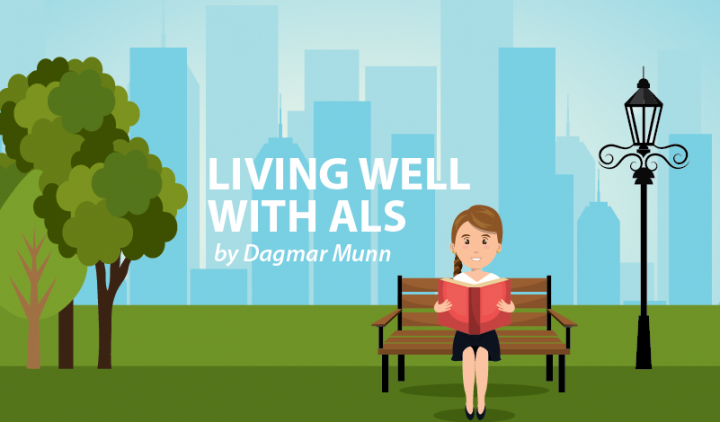Are You Fighting Battles or Just Encountering Speed Bumps?

As I travel down life’s highway with ALS, I’m always on alert for speed bumps. These are the metaphorical unknowns that pop up to challenge my resilience and positive mindset. Last week, one too many speed bumps came my way. It almost felt like a daily battle.
What happened?
Well, it all began with my washing machine breaking down in the middle of a load of laundry. Yes, the water had to be bailed.
Then the printer went kaput. Printers, I’ve since learned, defy repairs, forcing the purchase of a new unit.
Finally, our cable TV provider called needing to replace our cable box. That endeavor left us with a broken TV. The issue even stumped the two repair technicians who eventually reconnected all the wires and left at 7 p.m.
One more speed bump: The next morning, I woke up to the beeping of a smoke alarm alerting that its battery needed changing!
Was I fighting an invisible enemy?
It almost felt like a battle, but I’ve learned to keep a positive mindset and accept life’s speed bumps as part of living in the modern world.
Negative self-talk can be internalized and creates body-mind stress. Adrenaline and cortisol released during the stress response can suppress the body’s immune system and lead to increased inflammation. Additionally, heart rate, blood pressure, and muscle tension are negatively affected by mental stress.
The ALS battle
What continues to surprise me is that so many in the ALS community refer to the disease using terms of battle in statements such as:
“It was a constant battle to wake up wondering what the day would bring.”
“We admire patients’ courage in their battle to fight ALS.”
Truth is, I’m not in a battle with anything. I’m not fighting an enemy or waging war against a tide of invaders. I don’t wake up every morning thinking, “OK, feet, put up your dukes, ’cause if you don’t start walking right, we’re gonna have a real battle this time!”
I know my feet and legs aren’t at fault. More importantly, I’m not at fault. This condition of ALS is happening on a deeper, cellular level. It’s a part of me.
Instead, I wake up every morning wondering how I can bring more well-being into my day. I use the words compassion, kindness, calm, and healing.
How to turn battles into speed bumps
- Tap into your inner resilience and focus on one thing at a time.
- Assess what happened and how you can adapt.
- Refocus your attention to a special project that gives your life a purpose.
Try to maintain an awareness of your self-talk and the words you use. Remember that you can’t always avoid the speed bumps, but you can change how you react to them.
You can live well while living with ALS.
***
Note: ALS News Today is strictly a news and information website about the disease. It does not provide medical advice, diagnosis, or treatment. This content is not intended to be a substitute for professional medical advice, diagnosis, or treatment. Always seek the advice of your physician or other qualified health provider with any questions you may have regarding a medical condition. Never disregard professional medical advice or delay in seeking it because of something you have read on this website. The opinions expressed in this column are not those of ALS News Today or its parent company, Bionews Services, and are intended to spark discussion about issues pertaining to ALS.








Dave Reckonin
'compassion, kindness, calm, and healing.'
All these things will not stop, reverse or cure ALS.
They will definitely make you feel better, but whilst our/your ALS progresses at its own chosen speed.
Therefore, they are placebos.
They are a wonderful escape from reality, and very inexpensive in monetary terms.
Dagmar Munn
Dave - - I agree in general, but... My column didn't mention "stopping, reversing or curing ALS," only that thoughts towards oneself of compassion, kindness and calm will at least not make things worse. In fact, research shows that the opposites: anger, anxiety and worry all can trigger pain, inflammation, muscle tightness, fatigue and more. ALS is not some errant outside pathogen running amuck in our bodies. It is a dysfunction of DNA and cell activity - -it is a dysfunction in our body. There are numerous modalities that can slow and change the course of this disease - - our own emotions being one of them! I've often quoted research on emotional stress leading to less coping and increasing depression. Both signals of early demise.
In addition, placebos can be positive and can be used towards relieving pain, improving attitude and overall health. Placebos and the positive thoughts I mention, are a valid reality. Each one of us can choose to experience our reality either positively or negatively.
Dave Reckonin
Placebos are self-deception. Our ALS isn't interested in how we feel or behave.
You should ask yourself and be prepared to prove that your attitude etc. acts against your ALS or whether you simply have a very slow-progression form of ALS.
Our neurologist says there is no evidence that being psychotically cheerful, or even mildly upbeat, makes us live longer.
I don't think appendicitis sufferers live longer by being happy-clappy.
Those with slow-progression ALS should thank their lucky stars they have beaten the averages and may live long enough to see the first effective treatment.
Dagmar Munn
Dave, I find a few misconceptions in your comments and to benefit the other readers, I offer my reply:
"Placebos are self-deception." I agree but, they are a positive deception. The Placebo Effect has a 15-72% success rate https://www.health.harvard.edu/mind-and-mood/putting-the-placebo-effect-to-work and that's saying a lot for something that is “nothing!” The mind and body are forever linked and rather than dismiss the placebo effect or the practice of optimism, we should embrace them and research even more.
"Our ALS isn't interested..." ALS is a condition not an "it" with feelings or thoughts. We shouldn't humanize ALS; making into an entity outside of ourselves. ALS is a dysfunction of the signaling sent to motor neurons; causing their death.
RE: “progression…” I may or may not have a slow-progression. Regardless, I do believe that many of the things I do have an influence on my progression; such as: attending an ALS Clinic, appropriate medication, exercise, sleep, nutrition and yes, having an optimistic attitude.
"Our neurologist..." Your neurologist may be in the minority here, as the mind-body connection is well accepted by medical experts.
"Appendicitis...” You are comparing an acute illness to an ongoing chronic condition. No connection.
Finally, I am always grateful and thankful as to my current status of ALS, and do hope we all live to see the discovery of treatment, prevention and a cure.
Patricia Riascos
Yes indeed. everything in life is about attitude, that's the ONLY thing we have control over!
Julie Vander Meulen
Excellent article, as always. While you speak to the condition of ALS everything you address can be applied to everyday life, which is what makes your words and thoughts so valuable. Grateful you are finding ways to maintain a positive attitude and share it with others.
Dagmar Munn
Thank you Julie!
Beverly Savage
Dagmar,
It’s wonderful that you can feel that way. As a caretaker, there is no way I can put a positive spin on ALS. Everyday I watch my husband sink further and further into a black hole dug by this horrible disease.
Dagmar Munn
Beverly, As your husband's caregiver you do not need to put a positive spin on the condition of ALS - - but rather, my writings suggest trying to take the more positive approach to attitude and acceptance of the condition. If your husband is sinking into a black hole, perhaps he could benefit from professional guidance. You are a team. You affect each other. I hope you both find peace on your journey together with ALS.
Susan
Thanks Dagmar for your never-ending positive attitude. I, for one, so look forward to your column. While they may not speak to everyone, I'm confident that there are many of us PALS that find them comforting and inspirational. Please don't stop.
Dagmar Munn
Thank you Susan!
Creighton Rider
Nice article, Dagmar. Thanks. A positive outlook always trumps a negative one. In addition to helping our own well being, an upbeat attitude makes it so much easier for others to be around us. Despite the apparent sadness of our situation, our calm and peaceful demeanor can uplift others. It allows us to give something of value for change.
An acquaintance of mine who passed away from ALS a few years ago left a zen-like quote I have always remembered - “Suffering is resisting what is “. This goes hand in hand with another quote from a friend facing a difficult development: “Don’t brace for change, EMBRACE it”.
Keep up the good work.
Dagmar Munn
Thank you Creighton! That was a great quote, thanks for sharing it.
Here is another one that may be of help to readers:
"An optimist is really just a positive realist who is neither naive, nor in denial, nor blind to the realities of life."
Jack
My PALS is in constant pain everyday. We have tried so many medications but they only help is moderately. He gets spasms and his legs are spastic ALL the time. Again, tried all medications. It is next to impossible for him to be positive. Nice article but for some, this is not possible. It only keeps getting worse with ALS and there are varying degrees of what ALS looks like for someone. Choking on your saliva, increased pain, anxiety increases, spasticity get worse. Imagine if you had to wake up everyday and feel like a truck hit you the previous day...you were in that much pain...really, you wont be thinking how you can bring more compassion into the world. It is a HUGE battle for some.
Dagmar Munn
You are correct Jack; every ALS patient has different and unique symptoms and experiences with ALS. So my writings may not apply to some, but will for others.
The point of my statement about compassion is: for the ALS patient, our first priority is to ourselves. Our thoughts of "compassion, kindness, calm, and healing" should be directed inward; to our body, mind and spirit.